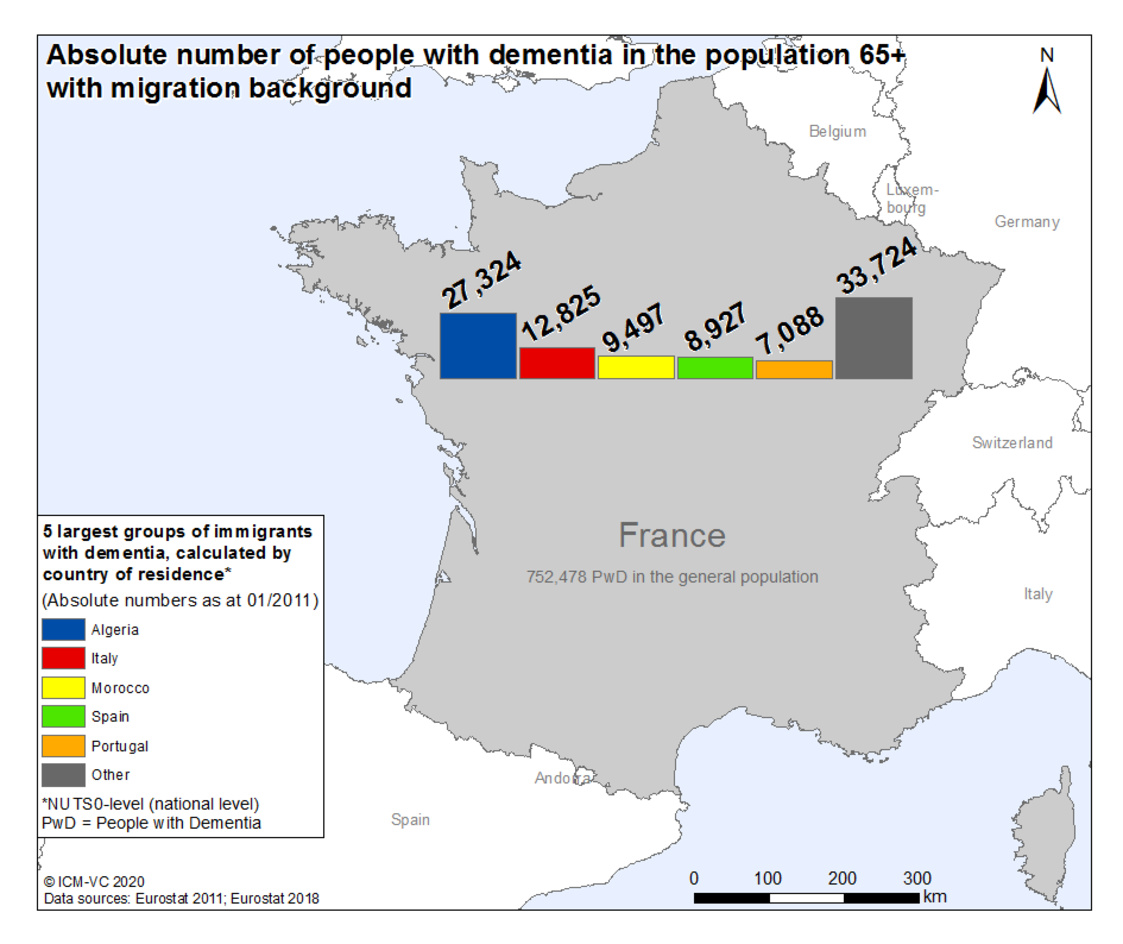EU-Atlas: Dementia & Migration
| Largest group | 2. largest group | 3. largest group | 4. largest group | 5. largest group | |
| Absolute numbers | |||||
| PwMD per 100,000 inhabitants 65+ |
| Absolute numbers | PwMD per 100,000 inhabitants 65+ | |
| Largest group | ||
| 2. largest group | ||
| 3. largest group | ||
| 4. largest group | ||
| 5. largest group |
| Prevalence per 100,000 inhabitants 65+*, calculated by country of residence | |||
|---|---|---|---|
| high > PwMD |
minor > - PwMD |
||
| increased > - PwMD |
low ≤ PwMD | ||
| medium > - PwMD |
|||
| PwMD = People with a Migration background with Dementia *Bulgarien, Litauen, Malta, Polen in der Bevölkerung 60+ |
|||
| Absolute number of PwMD 65+ | |
| PwMD per 100,000 inhabitants 65+ |
France
France has a long immigration history. To this day, the immigration situation is strongly influenced by the colonialism of the past centuries and the long tradition of recruiting foreign workers1. Overall, immigration has risen continuously since the mid-19th century [2]. After the two wars of 1870/71 and 1914 - 1918, France concluded agreements with Italy, Belgium, Poland, and Czechoslovakia for the recruitment of workers. In the 1950s and 1960s, the government again recruited large numbers of workers from Italy, Portugal, Spain, Belgium, Germany, and the Russian Federation. At the same time, immigration from the former colonies increased. After the Algerian war (1954 - 1962), a large number of people from Algeria came to France1. Despite the political shift from an open to restrictive immigration policy towards African refugees at the end of the 20th century2, the migrant population (born abroad) has risen from 5.9 million to 8.3 million between 1990 and 20193.
There are 1,440,400 people with a migration background aged 65 or older. Of those, approx. 99,400 are estimated to exhibit some form of dementia. Calculations show the most affected migrant groups presumably originate from Algeria (approx. 27,300), Italy (approx. 12,800), Morocco (approx. 9,500), Spain (approx. 8,900), and Portugal (approx. 7,100)4.
In 2008, France has published the ‘National Plan for „Alzheimer and Related Diseases“ 2008-2012’ which content is arranged into 3 large sections. The first section entitled ‘Improving Quality of Life for Patients and Carers’, the second section ‘Knowledge for Action’ and the third section ‘Mobilizing Around a Social Issue’5. Furthermore, the ‘Plan Maladies Neurodédégéneratives 2014 – 2019’ was published in 2014. This document covers, inter alia, the promotion of quality diagnosis, the access to quality care, the adaption of the training of professionals to improve the quality of response to sick people, the facilitation of living with the disease in an inclusive society, the support of caregivers, the mitigation of the economic consequences of the disease, and the strengthening of research6. In none of the two documents is the topic of migration addressed. Besides four documents containing guidelines or recommendations at the national level could be identified. The first ‘Guide for Care for Alzheimer's disease or a related condition’ provides recommendations for accompanying a patient to specialist counseling, preserving the patient's environment, supporting the caregiver, managing chronic behavioural disorders, and providing care until the end of life7. The second document addresses the topics of diagnosis and patient care, quality of life of patients and residents, and developing research8, the third document focus on activities related to the therapeutic concept of unaccompanied persons, and a specific internal professional organisation9, and the fourth document deals with the implementation of a housing project, the organisation of the arrival of the residents, as well as the reception and support of residents accommodated in reinforced housing10. However, none of the four guideline/recommendation documents refer to migration.
References
- Engler M: Country Profile France. In. Edited by Hamburgisches WeltWirtschaftsInstitut, Bundeszentrale für politische Bildung, vol. 2. Hamburg; 2007.
- Bernard F, Bisson TN, Popkin JD, Flower JF, Blondel JFP, Fournier G, Drinkwater JF, Elkins TH, Higonett PLR, Tuppen JN, Bachrach BS, Shennan JH, Weber E, Woloch I, Wright G: Immigration. [https://www.britannica.com/place/France/Immigration]. (2020). Accessed 21 Jul 2020.
- International Organization for Migration: Total number of international migrants at mid-year 2019: France; 2019.
- Eurostat: Census 2011; 2011.
- National Plan for "Alzheimer and related diseases" 2008-2012; 2008.
- Ministere de L'education Nationale, de l'Enseignement Superieur et de la Recherche France, Ministere des Affaires Sociales, de la Sante et des Droits des Femmes France: Plan Maladies Neurodegeneratives 2014-2019. In.: Ministere de L'education Nationale, de l'Enseignement Superieur et de la Recherche France, Ministere des Affaires Sociales, de la Sante et des Droits des Femmes France; 2014: 124.
- Haute Autorité de Santé: SYNTHÈSE DU GUIDE PARCOURS DE SOINS DE LA MALADIE D’ALZHEIMER OU D’UNE MALADIE APPARENTÉE; 2018.
- Agence nationale de l'évaluation et de la qualité des établissements etservices sociaux et médico-sociaux: ADAPTER LA MISE EN OEUVRE DU PROJET D’ÉTABLISSEMENT À L’ACCOMPAGNEMENT DES PERSONNES ÂGÉES ATTEINTES D’UNE MALADIE NEURO-DÉGÉNÉRATIVE EN EHPAD; 2018.
- Agence nationale de l'évaluation et de la qualité des établissements etservices sociaux et médico-sociaux: L’ACCUEIL ET L’ACCOMPAGNEMENT DES PERSONNES ATTEINTES D’UNE MALADIE NEURODÉGÉNÉRATIVE EN PÔLE D’ACTIVITÉS ET DE SOINS ADAPTÉS (PASA); 2017.
- Agence nationale de l'évaluation et de la qualité des établissements etservices sociaux et médico-sociaux: L’ACCUEIL ET L’ACCOMPAGNEMENT DES PERSONNES ATTEINTES D’UNE MALADIE NEURODÉGÉNÉRATIVE EN UNITÉ D’HÉBERGEMENT RENFORCÉS (UHR); 2017.


![[Translate to Englisch:] Logo RBS [Translate to Englisch:] Logo RBS](/fileadmin/_processed_/9/7/csm_RBS_Logo_RGB_0e245a98a4.jpeg)